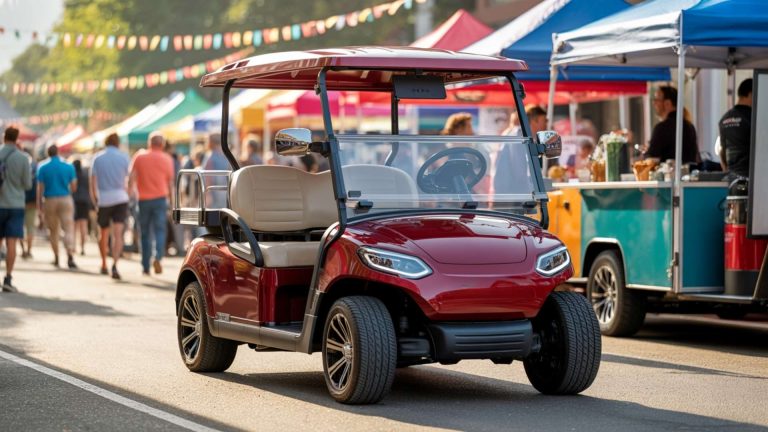
Why Are Elecrtic Golf Carts Cheaper To Run Verses Gas Golf Carts?
Electric golf carts are cheaper to run than gas-powered models due to lower energy costs, minimal maintenance requirements, and longer-lasting components. They also qualify for financial incentives and avoid environmental or noise-related costs. For anyone looking to save money in the long term while enjoying a sustainable and efficient ride, electric golf carts are the clear winner.
1. Lower Energy Costs: Gasoline vs. Electricity
Fuel Costs Comparison
- Gas-Powered Golf Carts:
- The average gas-powered golf cart uses about 1 gallon of gas to travel 25 miles.
- As of recent estimates, the average cost of gasoline in the U.S. is $3.80 per gallon (prices vary by region).
- Electric Golf Carts:
- Electric golf carts consume roughly 3-5 kWh of electricity per full charge, depending on the battery size and model.
- The average cost of electricity in the U.S. is $0.15 per kWh. For a full charge, the cost is $0.45 to $0.75, and an electric golf cart can travel 25 miles on a single charge.
Price Per Mile Comparison
- Gas-Powered Golf Cart: Costs approximately $0.15 per mile (based on $3.80 per gallon and 25 miles per gallon).
- Electric Golf Cart: Costs approximately $0.02 to $0.03 per mile (based on $0.45 to $0.75 per charge and 25 miles per charge).
Gas-Powered Golf Carts:
- Fuel consumption: Approximately 1 gallon of gas for every 25 miles.
- With gas prices averaging $3.80 per gallon, this equates to $0.15 per mile.
- A full tank (5 gallons) costs about $19, providing a range of 125 miles.
Electric Golf Carts:
- Energy consumption: Approximately 3-5 kWh per full charge, depending on the battery.
- With electricity rates averaging $0.15 per kWh, a full charge costs $0.45 to $0.75.
- Range: 30-80 miles per charge depending on battery type.
Cost-to-Range Comparison:
- Gas-powered cart (100 miles): ~$15.20.
- Electric cart (100 miles): ~$2.25.
Savings:
- Electric golf carts are 85% cheaper to operate per mile.
Percentage Savings:
- Switching to an electric golf cart reduces the cost of energy per mile by approximately 80%-87%, making it significantly more economical to operate over time.
Gas-Powered Golf Carts:
- Typical gas-powered carts have a range of 100-150 miles per tank, depending on the tank size (usually 5-6 gallons) and driving conditions.
Electric Golf Carts:
- Electric carts powered by lead-acid batteries typically have a range of 30-40 miles per charge, while carts with lithium-ion batteries can achieve ranges of 60-80 miles per charge, depending on the battery capacity.
Cost-to-Range Ratio
- For a gas-powered cart traveling 100 miles:
- Fuel cost = 4 gallons x $3.80 = $15.20.
- For an electric cart traveling 100 miles (lithium battery):
- Energy cost = 15 kWh x $0.15 = $2.25.
The electric cart costs 85% less to travel the same distance, despite its slightly shorter range in most cases.
2. Minimal Maintenance Requirements
Pain Point: Gas-powered carts require regular maintenance, such as oil changes, spark plug replacements, and filter cleanings. These ongoing costs can add up quickly, increasing the total cost of ownership.
Solution: Electric golf carts have fewer moving parts, which means they require less maintenance. Without an engine, there’s no need for oil changes, and with fewer components like belts or carburetors, repairs are less frequent and less expensive. Battery upkeep is straightforward, involving occasional water refills (for lead-acid batteries) or none at all for lithium-ion batteries.
Gas-Powered Golf Carts:
- Frequent Maintenance Needs:
- Oil changes every 6-12 months (~$30-$50 per service).
- Spark plug and filter replacements (~$100/year).
- Higher wear-and-tear on engine components.
- Estimated Annual Maintenance Cost: $300-$500.
Electric Golf Carts:
- Minimal Maintenance Needs:
- Lead-acid batteries require water refills and cleaning (~$100/year).
- Lithium-ion batteries require virtually no maintenance.
- No oil, spark plugs, or engine-related parts to replace.
- Estimated Annual Maintenance Cost: $100-$200.
Savings: Electric golf carts reduce maintenance costs by up to 60%.
3. Longer Lifespan of Components
Pain Point: Gas engines experience wear and tear at a faster rate, requiring part replacements that can be expensive and time-consuming.
Gas-Powered Golf Carts:
- Dependence on fuel makes operating costs susceptible to price fluctuations.
- Gas stations may be inconveniently located depending on use case.
Electric Golf Carts:
- Batteries last 5-8 years for lead-acid and 10+ years for lithium-ion.
- Cost to replace batteries:
- Lead-acid: ~$800-$1,500 for a full set (every 5-8 years).
- Lithium-ion: ~$2,000-$3,000 (lasts longer with higher efficiency).
- Charging Costs: Average $50-$75 annually for electricity.
Savings: Over a decade, an electric cart with lithium-ion batteries may still cost less to fuel and maintain compared to a gas-powered cart.
Solution: Electric golf carts have motors that last longer than gas engines due to fewer mechanical stresses. Modern battery technology, especially lithium-ion, provides extended battery life and consistent performance over years of use. This longevity reduces replacement costs and ensures reliability.
4. Incentives and Rebates
Pain Point: Gas-powered carts don’t qualify for any financial incentives, increasing the upfront and long-term costs for owners.
Solution: Electric golf carts often qualify for local or federal incentives, such as tax credits or rebates, which reduce the initial purchase price. These incentives make switching to an electric model even more cost-effective.
5. Environmental and Noise Savings
Pain Point: Gas carts contribute to environmental pollution and are noisy, making them less desirable in neighborhoods or eco-sensitive areas. Over time, restrictions on gas-powered vehicles in certain areas can limit their usability.
Gas-Powered Golf Carts:
- Emissions: Produce harmful gases, contributing to air pollution.
- Noise: Louder engine operation, less suitable for quiet environments like neighborhoods or resorts.
Electric Golf Carts:
- Emissions: Zero emissions, making them eco-friendly.
- Noise: Nearly silent operation, ideal for peaceful settings.
Benefit: Electric carts reduce environmental and noise impact, aligning with modern sustainability goals.
Solution: Electric golf carts produce zero emissions and operate quietly, saving owners from potential fines or limitations in certain locations. Their eco-friendly design ensures they remain a viable option for years, avoiding regulatory costs associated with gas models.
6. Resale Value
Gas-Powered Golf Carts:
- Retain value better in regions without access to electric charging infrastructure.
- Higher maintenance needs can reduce resale appeal.
Electric Golf Carts:
- Increasing demand for eco-friendly options boosts resale value.
- Lithium-ion models command higher resale prices due to longevity.
Advantage: Electric carts, especially with lithium-ion batteries, are more appealing on the resale market.
7. Total Cost of Ownership Over 10 Years
| Cost Component | Gas Cart | Electric Cart (Lead-Acid) | Electric Cart (Lithium-Ion) |
|---|---|---|---|
| Purchase Price | $8,000 | $7,000 | $9,000 |
| Fuel/Energy Costs | $1,500/year | $75/year | $75/year |
| Maintenance Costs | $400/year | $150/year | $100/year |
| Battery Replacement | N/A | $1,000 every 5-8 years | $2,500 every 10 years |
| Total (10 Years) | $23,000 | $10,750 | $12,250 |
Savings: Over 10 years, electric carts save owners 50%-55% in total operating costs compared to gas carts.
GET THE GOLF CART LSV AT THE RIGHT PRICE!
Tigon Golf Carts proudly offers 0% Vehicle Financing, making it easier than ever to own your dream golf cart. With flexible payment options and competitive rates, we ensure that Upgrading or Purchasing for the first time is not only exciting but also financially feasible for our customers, allowing you to hit the road in style without breaking the bank.















